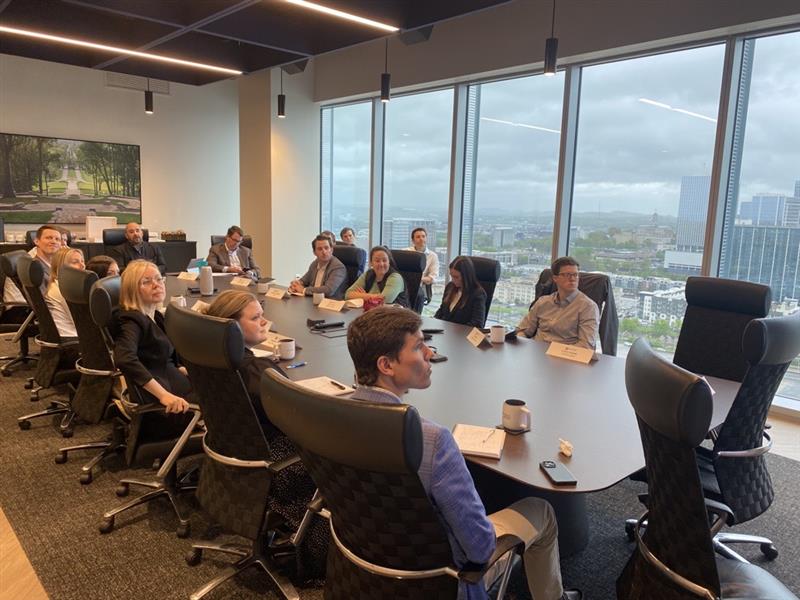A Crucial Conversation: Private Equity Ownership in Healthcare
The Nashville Healthcare Council’s Crucial Conversations series continues to tackle the most pressing topics in healthcare. In a recent session, industry leaders delved into workforce retention strategies, exploring how organizations can adapt to evolving employee expectations through purpose-driven leadership and innovative technology.
Private Equity Ownership in Healthcare
The Nashville Health Care Council’s May 13th Crucial Conversations event provided a timely exploration of private equity (PE) in healthcare. The conversation, led by Katie Fellin, Partner with ECG Management Consultants, and a panel of private equity experts featured Robbie Allen, CEO, US Heart & Vascular, Krysta Cass, Senior Portfolio Chief of Staff, Council Capital & President of Savida Health and Advanced Behavioral Solutions, and David Jones, CFO of TeamHealth.
The candid dialogue examined the complexities and realities of private equity-backed healthcare delivery, and the panel cut through polarizing headlines to spotlight what works, what doesn’t, and what is ahead.
Private Equity’s Reputation is Shifting
The panel acknowledged growing public criticism of PE’s role in healthcare, fueled in part by headlines around the recent collapse of Steward Health. The discussion pointed to the downfall of Steward Health Care not solely falling on its capital structure, but rather management challenges and failing hospital infrastructure.
“These were struggling nonprofit hospitals... and somebody took a shot at trying to preserve them,” said Jones. While the outcomes were unfortunate, he stressed that for every high-profile failure, there are many examples of PE-backed healthcare models functioning effectively, particularly when aligned with strong governance and operational focus.
The panel agreed that this current example should not overshadow the broader value that private equity can provide, particularly in underserved markets.
Alignment is Required for Success
A key point of discussion across the panel was the importance of alignment, particularly with physicians. Cass described how successful PE-backed models prioritize provider engagement, performance incentives, and transparent communication. In her operational work with Council Capital portfolio companies, she described building physician incentive models based on clinical performance, ownership education, and shared decision-making.
It is much different when you are in practice, because when you act like an owner…you understand the long-term objectives, explained Cass. Jones also echoed the importance of competitive compensation. He highlighted the critical piece of investing in revenue cycle solutions so companies can pay market rates. Both rejected the idea that PE requires physician pay cuts, and they described such cuts as economically unsustainable and an operational mistake.
“Good private equity doesn't come in and alter the aspects of clinical medicine,” said Allen. “We're in the business providing a menu of solutions based on things that we’ve seen. Done well, it's a partnership.”
Accountability is a Differentiator
Throughout the discussion, accountability emerged as a core differentiator between responsible PE and models that fail. Cass reflected on her early-career experience, which she described as lacking transparency and community engagement. Without enforcement of strategic actions and a deep understanding of a regional ecosystem and its providers, problems are inevitable.
In contrast, she described current efforts at SaVida Health and other portfolio companies as being anchored in availability to stakeholders. When a team of individuals is centered on the same pillars of healthcare, [private equity] works and can be replicated over and over, shared Cass. She emphasized the need to be transparent with providers about operational plans, reinvesting savings into patient care to improve outcomes, and setting clear, measurable goals.
Partnerships May be the Future
The panel explored how private equity-backed organizations can partner, rather than compete, with traditional nonprofit health systems. Cass described how SaVida Health works with nonprofits and local agencies to support patients with addiction and recovery needs, while also referring out when necessary. She cited community partnerships as a critical piece in addressing food insecurity, housing instability, and unemployment.
Allen added that joint ventures and clinical partnerships are becoming more common. “We believe medicine and healthcare in general is a team sport at its fundamental level,” he said. Strategic relationships can help each organization focus on what it does best. He acknowledged that patients want to go to a larger health system for those big, rare health events, but not for their routine care. Strategic partnerships support giving patients what they want, where they want it.
A Prediction in the Future of Private Equity
Despite economic uncertainty and growing regulatory scrutiny, all three panelists agreed: private equity will remain a fixture in the healthcare ecosystem. “Hard problems are where private equity should be focusing its money,” shared Allen. He continued to detail how private equity healthcare must manage the business, integrate, and operate in order to see returns.
Jones added that PE is well-positioned to step in where other funding sources can’t or choose not to. “There will be a need for capital, and I think that’s what private equity is going to deliver,” he added. With an acknowledgment that healthcare changes and development are not on a quick timeline, he pointed to the longer-term commitment of certain sponsors.
Closing Remarks
The panel ultimately framed private equity not as a monolithic threat, but as a strategic lever to be pulled. When applied with accountability and alignment, access is enhanced, capacity is expanded, and patient outcomes are improved. As pressure mounts on traditional healthcare systems, PE-backed innovation and disciplined partnership models may prove to not only be resilient, but vital to the healthcare sector’s future.
Thank you to our sponsors. Presenting: Holland & Knight Supporting: athenahealth
About the Nashville Health Care Council
The Nashville Health Care Council strengthens and elevates Nashville as The Healthcare City. With a $68 billion economic impact and 333,000 jobs locally, Nashville’s healthcare ecosystem is a world-class healthcare hub. Founded in 1995, the Council serves as the common ground for the city’s vibrant healthcare cluster. The Council offers engagement opportunities where the industry’s most influential executives come together to exchange ideas, share solutions, build businesses and grow leaders.

.jpg?width=352&name=6.12.24_LHC%20Private%20Equity%20Cohort%20(1).jpg)
